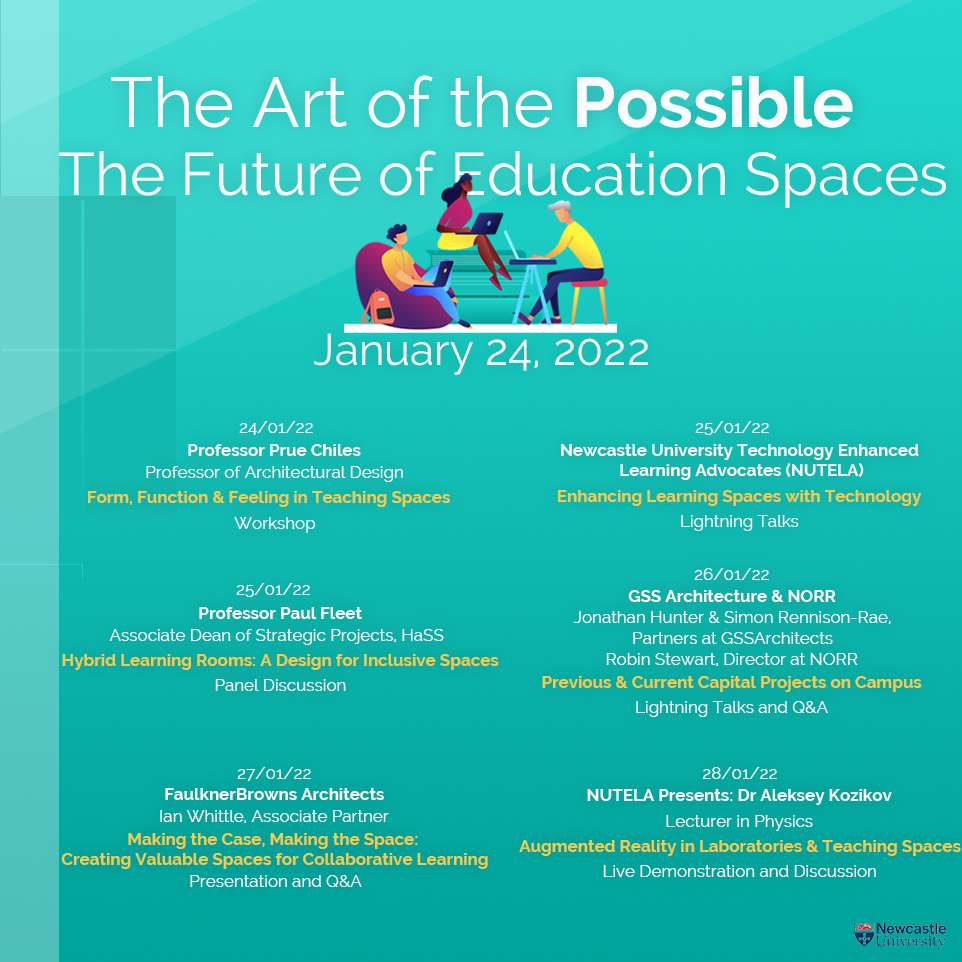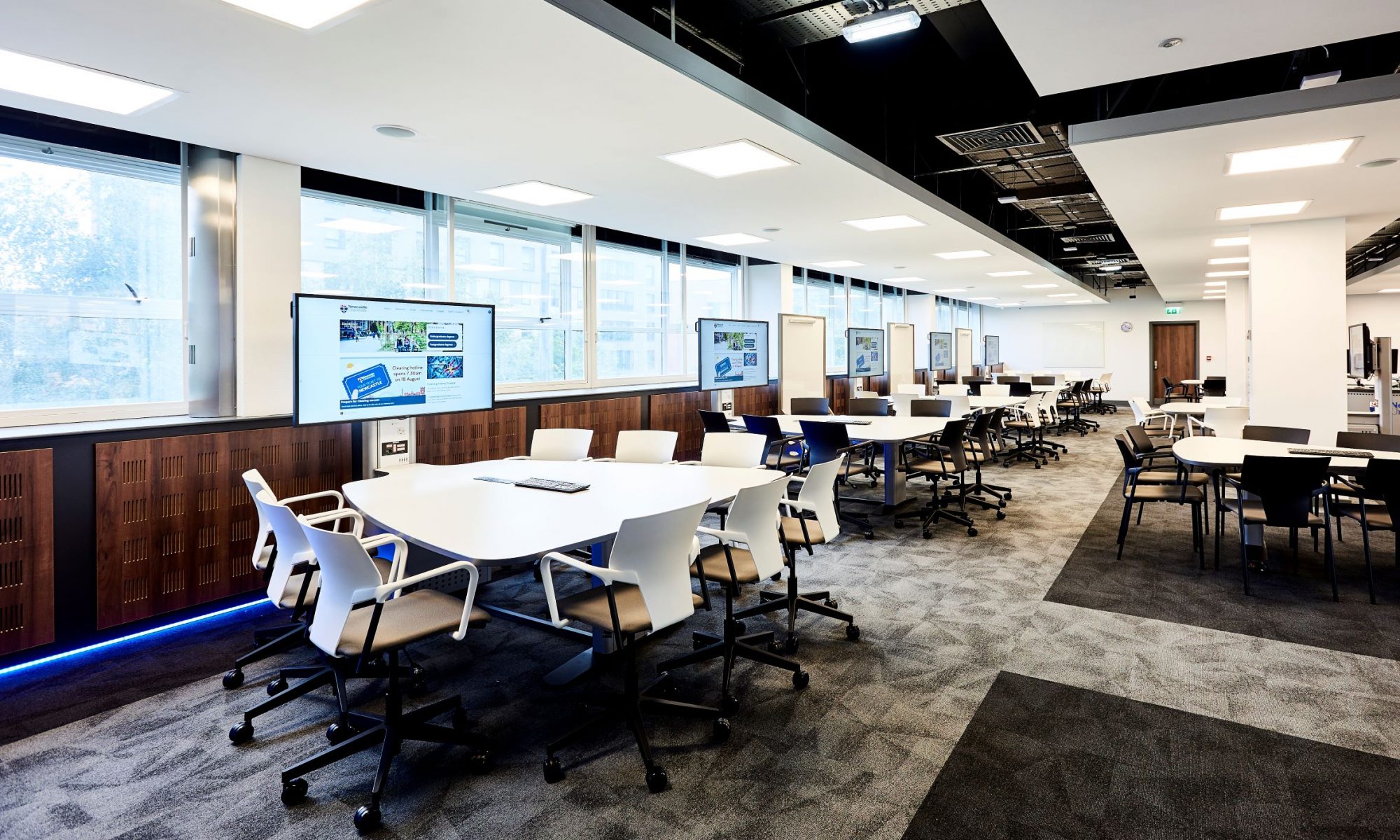
Monday 24th January ’22
Form, Function & Feeling in Teaching Spaces: Workshop, with Professor Prue Chiles, Professor of Architectural Design – 1 – 3pm
An interactive session with Professor Prue Chiles to discuss and debate what great teaching spaces could be and ways to achieve it. Through thoughtful design and understanding of both student and teacher, how can we design beautiful spaces which function for all and promote positive learning experiences.
In-Person Workshop: Location TBC
Tuesday 25th January ’22
Newcastle University Technology Enhanced Learning Advocates (NUTELA) Present: Enhancing Learning Spaces with Technology- 11am – 12
Hear ideas and current practice from colleagues across the University in this series of lightning talks exploring the innovative and future use of existing PiP teaching spaces on Campus for learning and assessment.
Presenters will discuss the future of spaces for digital exams with shifting assessment practices, how existing technology available to us all on campus can enhance education spaces for students and colleagues, and cutting-edge technology that could develop the blended learning experience.
Via Zoom
Tuesday 25th January ’22
Hybrid Learning Rooms: A design for inclusive spaces, with Professor Paul Fleet – 12.30-1.30pm
Come along to this panel discussion hosted by Professor Paul Fleet on the opportunities for hybrid learning as distinct from technology enhanced learning. Done well, hybrid learning offers the possibility to maintain the guidance and comfort of traditional courses for both remote students and those attending face-to-face – this event will give attendees the chance to input into the design of a new space on campus.
Via Zoom
Wednesday 26th January ’22
Lightning Talk & Panel Session with GSS Architecture & NORR – 12 – 2pm
Join Jonathan Hunter and Simon Rennison-Rae, Partners at GSSArchitects, and Robin Stewart, Director at NORR, for a series of lighting talks followed by a panel session and Q&A about Newcastle University’s latest Capital projects – The Dame Margaret Barbour Building, The Catalyst and Stephenson Building Redevelopment. This will be a chance to discover the ideas behind the briefs for each building, learn about their successes and what each building has to offer.
Via Zoom
Thursday 27th January ’22
Making the Case, Making the Space: Creating valuable spaces for collaborative learning, with FaulknerBrowns Architects – 12 – 2pm
Drawing on the experience he has gained over fifteen years delivering inspiring learning spaces with Universities across the UK, and undertaking extensive research to explore the ways in which space can support the ways we work and learn, Ian Whittle, Associate Partner FaulknerBrowns Architects, will give a presenation exploring:
- On-campus collaboration as a critical component of a blended learning experience.
- Making the case for collaborative teaching: How can we articulate the benefits for learning, wellbeing and sustainability?
- Making the space for collaborative teaching: delivering effective, flexible and sustainable spaces
Via Zoom
Friday 28th January ’22
NUTELA Presents: Augmented Reality in laboratories and teaching spaces, with Dr Aleksey Kozikov (Lecturer in Physics) – 10 – 11am
Join us for a live, in-person demonstration of using Augmented Reality within University teaching spaces, with lots of time for questions and discussion.
Laboratory skills courses are crucial in that they help students gain hands-on experience of doing experiments, better understand the theory behind them, see practical applications of their knowledge and skills, and provide a basis for future employment. These courses are part of professional accreditation for bodies such as the Institute of Physics and integral mode of delivery for many other programmes across the University.
Aleksey will discuss his experience of using Augmented Reality (AR) within laboratories to allow students to see the real and virtual world overlaid with each other. Within the demonstration you will see how when using a personal device, virtual objects (buttons, switches, cables, etc.) overlay with the real scenes and are made available for students to manipulate. With a switch to online learning, or to facilitate students learning remotely, the use of AR can be extended by using webcams located at the University to stream videos of real hands-on experiments live into students’ computers or tablets. With AR, students can handle virtual tools and perform the required tasks of experiments without stepping foot in a lab.
Herschel Annexe
